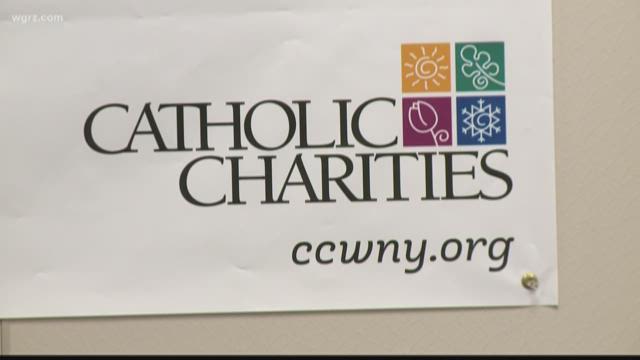BUFFALO, N.Y. - In a perfect world, Americans would donate money to charity regardless of any tax breaks.
But that's not reality. In the real world, donors make decisions based partly on the charitable deduction, which they can claim if they itemize their taxes. Currently, about a third of U.S. taxpayers choose to itemize instead of taking the standard deduction, making them eligible to write off donations and save some money.
That will change when President Trump signs the GOP's tax plan into law, leading to a ripple effect that could decrease the amount of charitable giving in this country by billions of dollars.
The explanation here is a bit lengthy, but basically, it all boils down to the drastic change in the standard deduction. The vast majority of taxpayers under the new U.S. tax code will opt for this standard deduction, which is doubling to $12,000 for individuals and $24,000 for married couples. In turn, the number of Americans opting for the itemized deduction may shrink from 30 percent to five percent, effectively excluding 30 million Americans from claiming charitable deductions on their taxes through itemizing.
So, in this imperfect world, charitable giving is now projected to decrease by $13 billion nationwide next year because taxpayers will have less financial incentive to donate to charity, according to a study conducted by Indiana University's Lilly Family School of Philanthropy. Erie County alone could see a $19 million drop in giving, the same study revealed (These numbers were provided to 2 On Your Side by a Western New York-based policy and research director for United Way, which is referencing the Indiana University study as it contemplates the impact of the tax plan).
The consequences could be severe for all local charities and not-for-profit organizations in Western New York.
Sister Mary McCarrick, the diocesan director for Catholic Charities in Buffalo, said the philanthropic foundation Giving USA told her to expect a 2 to 5 percent drop from large donors as a result of the new tax code. Roughly one third of the organization's donors give more than $5,000 at a time.
"We'd have to cut back on services. That would be the only possibility we'd have," Sister McCarrick said. "If we lost 2 to 5 percent of that money, that would be a very significant problem for an $11 million appeal."
The annual $11 million in fundraising helps support every aspect of Catholic Charities, which has seven food pantries in Western New York and also relies on donations for clothing, toys and counseling services.
Sister McCarrick said she's already fielded some phone calls from people asking if they can donate immediately in order to claim the charitable deduction on their 2018 taxes in April, before the new tax code would take effect. Catholic Charities is accommodating those requests. Other people have also called her asking if they can make donations in the form of investments in order to bypass the income tax requirements.
The organization remains optimistic that it will be able to reach its fundraising goals, regardless of the tax code overhaul.
"We're seeing a growing number of people who are not church-affiliated — realizing the majority of the people we serve are not Catholic — and they're coming on board to help us," Sister McCarrick said. "So I'm hoping that will help us work against any national trend."
At Jewish Family Service in Buffalo, President and CEO Marlene Schillinger said she's still trying to assess the impact of the tax code on her organization. Jewish Family Service is a much smaller agency, collecting about $50,000 in donations each year.
Those donations, however, are critical. They help the agency buy extra items for people in need, such as bus passes, food, boots or notebooks for school.
"We need those resources, so that we can help where the federal government or other entities aren't stepping in. So we fill the holes," Schillinger said.
But if fewer people donate as a result of this tax plan, then those holes might not get filled.
"Depending on what the percentage looks like," Schillinger said, "it's going to be a hit for all of us."

